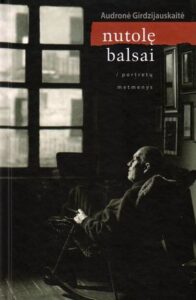Audronė Girdzijauskaitė. Distant Voices: Portrait Outlines

ARTS AND LITERATURE
Audronė Girdzijauskaitė, Distant Voices: Portrait Outlines (Nutolę balsai: portretų metmenys), Vilnius: Lithuanian Writers’ Union Publishing House, 2011, 360 pp.
How to recreate and preserve in the written word a past epoch, the lives of its witnesses, without erecting a grand monument to them and without placing them on an immutable pedestal? It looks as though this riddle has been solved by the famous Lithuanian theatrologist Audronė Girdzijauskaitė, who has masterfully recreated the past through sensitive and personal biographical sketches. This book contains twenty-six such sketches about famous Lithuanian actors, artists, musicians, critics, men and women with whom she lived, took holidays, or spent nights discussing art. Born into a family of doctors just before the World War II, Girdzijauskaitė has preserved the inherited patterns of behaviour and the unwritten moral code of the interwar Lithuanian intelligentsia. Her inner intelligence is the backbone of the book, around which the outlines of other people’s stories and their portraits are moulded. These portrait outlines are all different, as are the subjects of the portraits, – some more detailed, filled with excerpts from personal correspondence, others coarser and less polished. But they are all united by a personal relationship and point of view – each story is brimming with Girdzijauskaitė’s memories, accurate remarks and evaluations, adequate praise or fitting criticism. Reading this book, first of all, the scenes from the second half of the 20th century come to life before one’s eyes – with its dense friendship networks and unwritten codes of communication, with its coffee and cigarettes in kitchens in small apartments, with its secret gatherings in artists’ workshops, with its improvised celebrations and – despite the condition of the planned economy – its hardly-deficient rush of life, with its allotment gardens and sanatoriums, and last but not least, with that legendary centre of bohemianism during Soviet times – the ’Neringa’ cafe.
The author recreates the context of the narrated time and the circumstances of events in pithy sentences, and balances the mythologized stories of the cultural life of that time, then considered scandalous, on the side of morality and tact. One of the best contemporary Lithuanian poets, Aidas Marčėnas, calls Girdzijauskaitė’s style the “the restoration of memory in all its details”. All that remains is to add that these restored details of personal memory comprise a reasonably comprehensive picture of the informal life of the cultural intelligentsia during the Soviet era. This picture still contains compromises that were difficult to avoid at the time, but fortunately it also shows many more instances of disobedience to the official regulations of the Soviet regime and, most importantly, conveys the true colours and moods of the time.
Audronė Girdzijauskaitė – theatrologist, whose main research areas are: theatre history and theory, scenography, puppet theatre art, and Oriental theatre. In 1963, she graduated from the A. Lunacharsky Theatre Art Institute in Moscow. She worked in the Art History Group at the Institute of History of the Lithuanian Academy of Sciences and in the Lithuanian Culture Research Institute. She also taught theatre history at the University of Vilnius and the Lithuanian Academy of Theatre and Music. Girdzijauskaitė has written many monographs on Lithuanian theatre and its creators, has participated in the preparation of collective monographs ’History of Lithuanian Theatre’ (2000-2009). After publishing her first book of memoirs ’Islands of Memory’ in 2008, Girdzijauskaitė devoted herself to memoir texts, including ’Distant Voices’ (2011) and the biographical novel ’Wells of Memory’ published in 2020. In 2018, Girdzijauskaitė was awarded the Culture and Art Prize by the Government of the Republic of Lithuania.